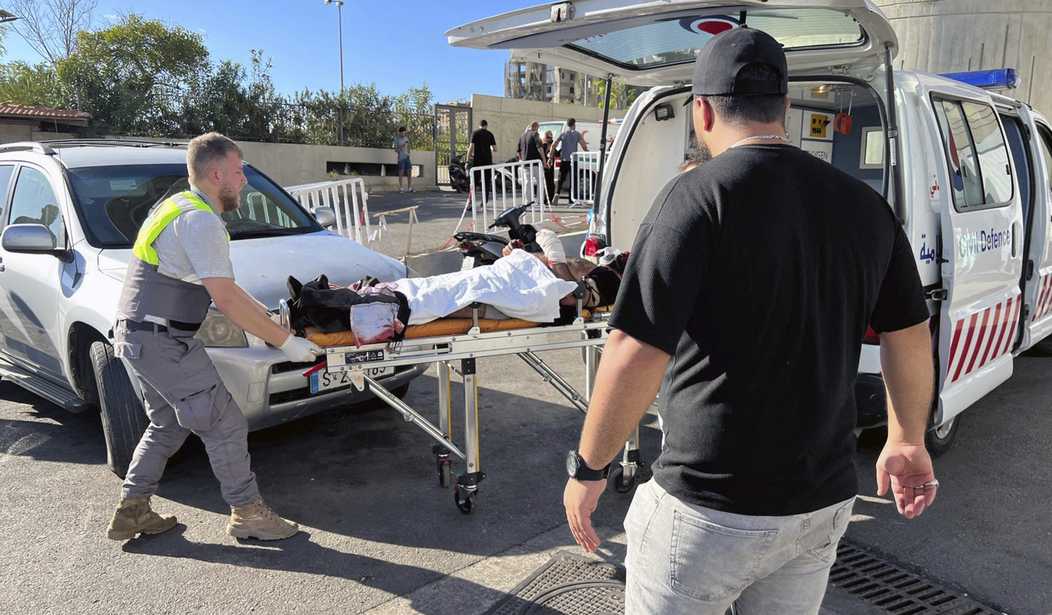All signs are pointing to an impending war between Israel and Hezbollah. The pager attacks on Tuesday and the walkie-talkie attacks on Wednesday were reportedly the opening salvo in this war,
CNN reported on Thursday that the pager attacks were "a surprise opening blow in an all- out war to try to cripple Hezbollah." The attacks continued on Thursday night, with the Israeli air force striking several villages in the Hezbollah stronghold of southern Lebanon.
Thousands of Israeli troops are massing along its northern border, preparing to invade Lebanon and "change the status quo," as the Associated Press described the action.
“You don’t do something like that, hit thousands of people, and think war is not coming,” said retired Israeli Brig. Gen. Amir Avivi, who leads Israel's Defense and Security Forum. “Why didn’t we do it for 11 months? Because we were not willing to go to war yet. What’s happening now? Israel is ready for war.”
Another clear sign that Israel is ready to invade is that the security cabinet of Prime Minister Benjamin Netanyahu has designated the return of displaced residents in northern Israel as an official war goal.
Hezbollah is in total disarray, "This isn’t a small matter, it’s war. Who can even secure their phone now? When I heard about what happened yesterday, I left my phone on my motorcycle and walked away," said Mustafa Sibal on a street near central Beirut.
“The mission is clear,” said Maj. Gen. Ori Gordin, who heads Israel’s Northern Command. “We are determined to change the security reality as soon as possible.”
That "reality" is that Israeli citizens in the north are living under intolerable conditions with Hezbollah rockets a daily threat.
Defense Minister Yoav Gallant on Wednesday night declared the start of a “ new phase” of the war as Israel turns its focus toward Hezbollah. “The center of gravity is shifting to the north by diverting resources and forces,” he said.
When American Middle East envoy Amos Hochstein met with Netanyahu earlier this week, the Israeli prime minister all but confirmed Israel is going to war.
According to a statement from his office, Netanyahu told Hochstein that Israeli citizens cannot go home without “a fundamental change in the security situation in the north.” The statement said that while Netanyahu “appreciates and respects” U.S. support, Israel will “do what is necessary to safeguard its security.”
Netanyahu all but blew off Joe Biden and his concerns about a wider war.
Israeli media reported Wednesday that the government has not yet decided whether to launch a major offensive in Lebanon.
Much, it seems, will depend on Hezbollah’s response. The group’s leader, Hassan Nasrallah, is expected to deliver a major speech on Thursday.
But public sentiment in Israel seems to be supportive of tougher action against Hezbollah.
A poll in late August by the Israeli Democracy Institute, a Jerusalem think tank, found that 67% of Jewish respondents thought Israel should intensify its response to Hezbollah. That includes 46% of Jewish respondents who believed Israel should launch a deep offensive striking Lebanese infrastructure, and 21% who seek an intensified response that avoids striking Hezbollah infrastructure.
“There’s a lot of pressure from the society to go to war and win,” said Avivi, the retired general. “Unless Hezbollah tomorrow morning says, ’OK, we got the message. We’re pulling out of south Lebanon,’ war is imminent.”
Lebanon is already a basket case. A war with Israel would deliver a blow that would take a generation to overcome. A once-beautiful, prosperous country—"The Paris of the Middle East," as Beirut was described until the 1970s—will become a pile of rubble.
Netanyahu and Israel are using the war against Hamas to start a war against Hezbollah. The real enemy in Tehran sees an unleashed Israel and wonders if they're next.










Join the conversation as a VIP Member